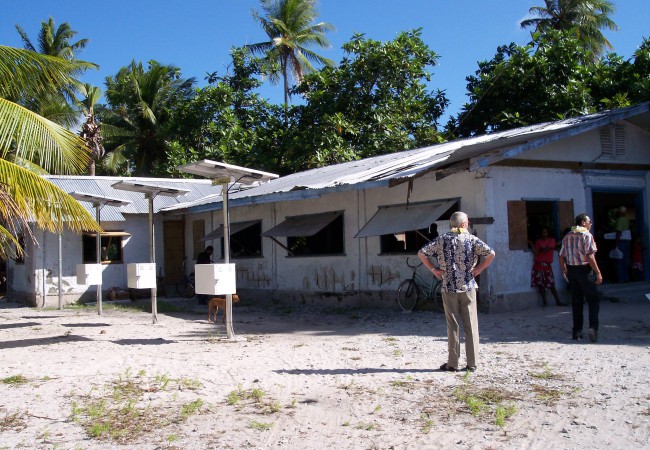
Do Pacific islands need to ‘walk the talk’ on climate?
In late May, 2014, a team of Greenpeace activists, including one from the Pacific, climbed aboard an oil drilling rig in the Barents Sea to protest offshore drilling, its contribution to climate damaging carbon emissions and the dangers of oil spills. Five months later, several dozen Pacific island ‘climate warriors’ joined Australian colleagues in Newcastle for a daylong blockade of vessels carrying shipments of coal for export.
The two protests were for the same purpose—to focus global attention on fossil fuels’ contribution to climate problems—but with one significant anomaly: the oil rig targeted by Greenpeace was flagged in the Marshall Islands, one of several atoll nations at the forefront of an international campaign to cut back use of fossil fuels and reduce carbon emissions.
This raises the question: Do small island nations that contribute little to the carbon problem globally need to change their ways as they are demanding of big nations? More specifically, is it hypocritical for an island nation to demand reductions in use of fossil fuel while at the same time profiting from business investments in fossil fuel?
Seven nations in the Pacific—the Marshall Islands, Kiribati, Tuvalu, Federated States of Micronesia, Palau, Tonga and Nauru—operate government trust funds with significant offshore investment. Generally these are a mix of fixed income (government bonds), real estate and stock market investments. Because investments in the fossil industry have produced some of the greatest profits in the history of stock markets in recent years (except for the past several months as oil prices have declined), virtually all big funds have some investment in the fossil fuel industry. A number of island nations also operate ship registries, led by the Marshall Islands, which has the world’s third largest registry behind Panama and Liberia. Significantly for the Marshall Islands, a major portion of the tonnage it flags is oil tankers and drilling rigs.
The Marshall Islands has been at the forefront of the climate action campaign with Foreign Minister Tony deBrum and, more recently, Kathy Jetnil-Kijiner making headlines globally calling for nations of the world to act to prevent a climate disaster already in progress. But governments in region with trust funds have not addressed the apparent conflict between profiting from the oil industry and demanding it be phased down.
While the Marshall Islands’ government has been silent at home on the issue, its voice internationally has grown greatly during Minister deBrum’s tenure in government since 2012. In recent months, however, the College of the Marshall Islands has taken up a campaign for divestment from the fossil fuel industry. The college has a small endowment fund of about a million dollars that is invested in the U.S. and global stock markets.
‘We will be crafting a policy statement for the Board of Regents so that the College of the Marshall Islands Endowment Fund is not investing in fossil fuel companies,’ said President Carl Hacker. ‘It is something we can do to contribute to the change that is desperately needed.’ Hacker said he was moved by researching what is being done globally to invest in climate-friendly corporations, and was particularly influenced by an article by Nobel Peace Prize winner Bishop Desmond Tutu on divestment and climate change. Jetnil-Kijiner, an instructor at the College of the Marshall Islands, has been a force behind the divestment movement with the college community.
The Majuro-based college is already the country’s leader in renewable energy, and is getting ready to purchase electric vehicles. Over the past three years, it has slashed US$300,000 a year off its electricity bill by using solar and wind power. Like action to use renewable energy, divestment is an important area for action, Hacker said.
The college administration engaged its Student Body Association to get students, teachers and staff talking about climate issues during a “divestment week” series of events in November. During the week, SBA members went from class to class educating their peers about divestment. The students wrote essays, drew posters and participated in a public forum on the topic. The public event was titled ‘CMI and Divestment — putting our money where our mouth is.’
These events at the college underscored the thinking of students, faculty and administrators that even though the endowment fund of CMI is relatively small and divesting will not affect fossil fuel companies, the issue is about taking a stand on principle. The students’ message: CMI should not talk about climate change and then reap interest from its investments in fossil fuel companies that profit by producing and selling the one product that is the largest contributor to climate change—fossil fuels.
In response to the divestment campaign within the college, the CMI board of regents in December directed the administration to divest from fossil fuel companies within three years.The divestment campaign at the college hasn’t spread to national government investments and the ship registry. But at some point the government, indeed all governments concerned with climate problems, will be forced to address the contradiction in demanding reduced global reliance on fossil fuels while at the same time profiting from the fossil fuel industry.
Thanks to donor funding, many Pacific islands have installed solar equipment on far-flung islands, bringing electricity for the first time to thousands of islanders and reducing modest usage of fossil fuel for power. These Pacific island actions are largely symbolic in terms of global impact, but everything from use of renewable energy and fuel-guzzling vehicles to divestment—or not—from the fossil fuel industry send a message to the world about small island states walking the climate talk.

